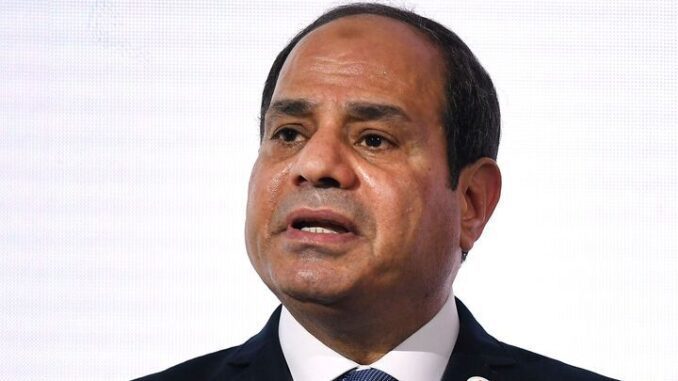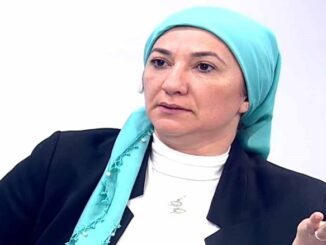
A recent report by WSJ explains how Egypt’s Abdel Fattah Al-Sisi is engineering another presidential election victory
A third term would cement Sisi’s position for six years, buying him time to change the law to stay in power longer, stated Wall Street Journal.
As Egypt prepares for a presidential election, authorities have detained dozens of opposition figures. Potential challengers to Egypt’s Abdel Fattah Al-Sisi say they are facing obstacles getting on the ballot. And some Egyptians have received food vouchers in exchange for their support, says Chao Deng in his report on WSJ.
Sisi, the 68-year-old general who came to power in a military coup a decade ago and this week announced his intention to run again, is seeking to bolster his standing amid a crippled economy, double-digit inflation, soaring national debt and a reduction in aid from the U.S.
The stakes for the just-called December poll are high, even for an autocrat known for winning elections by crushing margins—including with 97% of the vote in 2018. The president is now in the most challenging moment of his rule, as food inflation above 70% overwhelms his base of working-class Egyptians, leading to rare public criticism from people previously loyal to the regime and a sense among the opposition that his position is precarious.
A third term would cement Sisi’s position for another six years, potentially buying him time to prolong his term further by enacting laws, as he has done in the past.
Late Monday, Sisi announced his candidacy at a conference celebrating his record at the new administrative capital, a large construction project begun under his leadership that has added to the government’s debt pile.
“I have resolved to nominate myself for you [the people],” Sisi said, to loud cheers from his supporters amid fireworks and a light show.
U.S. lawmakers recently withheld $235 million in American aid to Egypt over its human-rights record and lapse in the rule of law. Sisi’s reliability as a U.S. ally has also come into question since Russia’s invasion of Ukraine, with Cairo considering sending Moscow ammunition for the war.
Sisi’s term was set to end in April and a vote was expected next year, but political analysts said the election authority moved polling up to ensure his re-election before authorities enact economic policies that would spell more financial pain for average Egyptians. Among the expected changes: a devaluation of the local pound that will further reduce people’s purchasing power.
Opposition politicians have accused some prospective candidates of cutting deals with the Sisi regime to help him hold on to power. Two presidential aspirants said they have been trying for more than a week to garner the tens of thousands of popular endorsements needed to qualify as a candidate. But they say they have faced physical obstruction from both police and plainclothes security officials, as well as from people professing to support Sisi.
“All security agencies, the media and station institutions are working for the interest of one candidate: the president,” said Mohamed Lotfy, executive director of the Egyptian Commission for Rights and Freedom, a rights group. “Any election that involves Sisi as a candidate won’t be free and fair.”
A spokesman for the president referred questions to the National Elections Authority, which didn’t respond to a request for comment.
The NEA said in a statement on its Facebook account Sunday that it had fixed unspecified “technical issues” at a few government notary offices managing endorsement submissions; it also said it extended working hours to address overcrowding.
Sisi was put in power in 2013 after the Egyptian military overthrew a democratically elected Muslim Brotherhood leader. Nearly a year later, he won the presidency by a landslide. He was re-elected in a 2018 vote that sidelined all of his serious opponents before he then lengthened the executive term-limit, enabling him to extend his time in office by two years to 2024.
Ahmed Tantawi, a journalist and former lawmaker who is seen as the most credible challenger to Sisi, has faced the most harassment according to activists, and hasn’t so far got the endorsements needed. More than 80 members of his campaign have been arrested in recent weeks.
Crowds of Tantawi supporters gathered at one government registry in Cairo on Tuesday, with some yelling at staff members for blocking their attempts to endorse him. “You will all be held accountable for this!” shouted Mohamed Khamis, a 21-year-old vocational college student.
Others at the registry were wary of getting detained, but spoke openly about the challenges of submitting their name to endorse their preferred candidate. “The first time I came, I saw a Tantawi supporter get beaten up,” said Yasmine Nader, a 30-year-old former schoolteacher, who only learned about Tantawi a few weeks ago via social media, and has tried repeatedly to endorse him.
“The next two times, we were told the system was down and we weren’t able to write down our names,” she said. Her fourth attempt Tuesday also failed.
By midday, Tantawi’s supporters were outnumbered by crowds of middle-aged Egyptian women who arrived by bus, professing their support for Sisi. A group of men blasted nationalist music across the street, waving Sisi banners.
The regime has also organized rallies in Cairo and other major cities and two pro-Sisi parties have put on events featuring football and music stars. Slogans chanted included “Long Live Egypt” and “We Love You, Sisi.”
Government employees are pressured to attend and even forced to turn over their national IDs to endorse Sisi, says Hanan Tantawi, a pharmacologist at state-owned National Research Center in Cairo. “It’s happened at some departments at my institute.”
On Monday, at a performance advertised by the pro-Sisi Nation’s Future Party as celebrating the coming anniversary of Egypt’s 1973 war with Israel, one woman working as a housekeeper said that she and most others around her were attending for “money and benefits” without elaborating.
“We are poor people—we care about feeding out children and nothing more,” she said, declining to share her name. “They are taking us from our homes to attend this.”



